KARACHI: Almost a decade ago, Khanzadi Baloch gathered a group of young girls under a tree in her village on the border of Sindh and Balochistan and began familiarizing them with basic alphabets and numbers. Her efforts turned out to be an instant success since there were no girls’ schools in her little hamlet — or in seven nearby villages — of Tehsil Garhi Khairo in Sindh’s Jacobabad district. Still only a teenager, she managed to set up an elementary school, attracting a significant number of students.
Baloch had a passion for education and, with an intermediate degree in pre-medical, was arguably the most well-read person in town. She singlehandedly taught these girls and refused to take a penny from them since she knew they came from an impoverished background.
“Nearly a year after I set up the school, an official from the education department, Hajji Maqsood Ahmed Brohi, saw us sitting under the tree,” she recalled while talking to Arab News. “When I told him my story, he said that I was doing commendable job.”
Six months after the chance encounter, Brohi made a surprise phone call to share the exciting news. “He told me that he had got approval to build a school using World Bank money,” she said. Her family provided land for the education institute, which was later built at a cost of Rs7.6 million.
Baloch and her family were impatiently waiting for completion of construction work, but they had different plans in mind. While she was dreaming of a primary school with the best education facilities, her uncle, Mir Dil Khan, and brother, Abdul Waheed, were secretly planning to convert the building into a village courtyard for greater social prestige.
“‘Your job is done,’ my brother told me. ‘We used you since we wanted a cement building’,” Baloch quoted her brother. Her entire village was a small collection of mud houses and a cement structure was nothing short of a novelty.
“I love my students,” she said in a faint voice. “I cried my heart out. Even today, the girls call me and say they want to go back to the school. But my family robbed us of our future. And this was done in connivance with the local sardar [feudal lord].”
Baloch had no option but to put her foot down. “I called up Brohi, who likened me to Malala [Yousafzai, the activist for female education] and said that I was being punished for creating awareness among the young girls of Sindh. He then called the district police officer, who sent his representative to our village.”
That only added to her miseries. “When I came home, my brother started beating me and then forcibly sent me to my maternal aunt’s residence where I lived for a few months.”
Her maternal uncle, Nawab Ali Baloch, took her to Shikarpur, another district in Sindh. Initially, she thought it was to let things cool down, but later the arrangement turned into an illegal confinement. “My uncle locked me in a room and took my cellphone,” she said. “However, I managed to make a call to the police helpline through my younger cousin’s phone.”
The police took Baloch and her uncle to their office. Subsequently, the local judge sent her to Darul Aman, a shelter for women, in Larkana and jailed her uncle. “My uncle’s wife begged me to change my statement,” she recalled. “After a great deal of emotional blackmailing, I retracted my statement which paved the way for my uncle release.”
Her family also asked her to come with them, but Baloch feared for her life and approached the Human Rights Commission of Pakistan (HRCP). She also reached out to a trusted cousin, Mahboob Ali Baloch, a Sindh police constable.
“We verified her story through our local network,” said Asad Iqbal Butt, of the HRCP.
The rights group gave her support after she left the shelter and moved to Karachi. In view of local sensitivities, however, its officials recommended that she marry a relative. This was to avoid the dangerous allegation of hurting her family honor, an accusation frequently made in such circumstances that can lead to “honor killings” in rural Sindh and other parts of the country. As a result, Baloch decided to marry her cousin who stood by her side.
“We married on July 4, 2015, yet we were declared as kari [guilty of undermining family honor]. This was done through a jirga that was arranged by the area’s sardar,” Mahboob Ali Baloch told Arab News.
“He had also attacked my family twice and, after their escape to Karachi, grabbed their cattle, land and other possessions that they had left behind,” he said.
Despite being part of the Sindh police, he lives in fear and changes his address every few months.
Although she is hiding in Karachi, Khanzadi Baloch, now the mother of a five-month-old child, has not given up efforts to take back her school. She has knocked at every door, and regularly visits HRCP’s office for help.
“The HRCP has been writing to the Inspector General of Police and other relevant officials, demanding protection for Baloch, her husband and son,” Butt said. “At one point, they had planned to return home after police assurance,” he said, “but local sympathizers revealed that a plan had been hatched to kill the couple.”
The HRPC also sought help from influential politicians, though, as Butt recalled, they subtly communicated that “the family and the local feudal had over 5,000 votes.”
“Such acts of injustices are daily occurrences, but with the effort of the provincial administration of Sindh, especially woman parliamentarians, such crimes can be decreased,” claimed Saira Shahliani, a female lawmaker of the Pakistan Peoples Party, who was elected on women’s reserved seat from Garhi Khairo.
When asked about this case, Shahliani said she had taken a personal interest in it. “When I heard about it, I went to her village where she was not present,” she said. “But I met with her parents, other family members and several other villagers. I also held a news conference in Jacobabad and assured them that I would support Khanzadi and will help her get justice.”
“In Karachi, I contacted her and she came to my house along with her husband,” she said. “She told me that she wanted to go back to her village. I talked to her parents, but they were not taking the responsibility of her husband’s family. According to them, her husband’s brothers-in-laws [brothers of his other wife] will kill both of them since they were powerful and had the support of the sardar.
“I talked to several influential people of the area, but no one was willing to take the responsibility. This was what I could do for her,” she said.
Asked why she did not involve the state, she said: “I went to senior superintendent of police of Jacobabad, Sajid Khokhar. He said that he had visited the village. When he heard that the school had been converted into the village courtyard, he had placed several restrictions on the use of the school. He also went to the women’s shelter to look for Khanzadi Baloch, but she had left by then.”
Meanwhile, there has been a change in Baloch’s hometown. The Sardar has passed away and his son, who is said to be educated, is at the helm of affairs. Although education sometimes fails to change the feudal mindset, the development has given Baloch and her husband new belief.
“We hope that he will do justice since I do not need anything,” she said. “I need a life and my school. That was my dream, and I want it back.”
‘Malala of Sindh’ fights to regain her school
‘Malala of Sindh’ fights to regain her school

Pakistani sister duo rebrands grandfather’s 50-year-old leather bag business, makes it online success

- Marium and Sakina Hussain manage most domains of the leather goods business they have named after their grandfather
- Offering a range of products, the sister duo now plans to not only launch a physical outlet, but expand it beyond Pakistan
KARACHI: Turab Ali Ismail Ji Munniwala, a skilled craftsman, set up a small leather retail shop in Pakistan’s commercial capital of Karachi in 1975 and put his heart and soul into making leather bags of various shapes and sizes. His son, Aqeel Hussain, took over the business ten years later and focused it on corporate giveaways, but after the passing of Munniwala more than three decades later, it became difficult for Hussain to run the business alone.
In conservative Pakistan, people often expect a male heir like Hussain, now in his 60s, to carry forward the family’s business and legacy, but Hussain had no son and his daughters, Marium and Sakina, determined to honor their late grandfather’s 50-year legacy, took it upon themselves and amazed many by making Munniwala’s leather bag business an online success.
The sister duo, 32-year-old Marium and 25-year-old Sakina who both had full-time careers as a graphic designer and a corporate lawyer respectively, set out to take their grandfather’s business online in February 2022. Today, their venture, named ‘Turab’ after Munniwala, is breathing new life into a legacy that could have faded away without them.
“It wasn’t a planned thing initially, but it just sort of came into being that ‘okay, who’s going to help Abbu [our father]?’,” Sakina recalled how Turab came to life.
“When we basically started to grow up, it was always a thing that who is going to take this business forward because we don’t have a brother. Living in a desi [local] household, it’s always a thing that businesses are being led forward by sons in a family.”
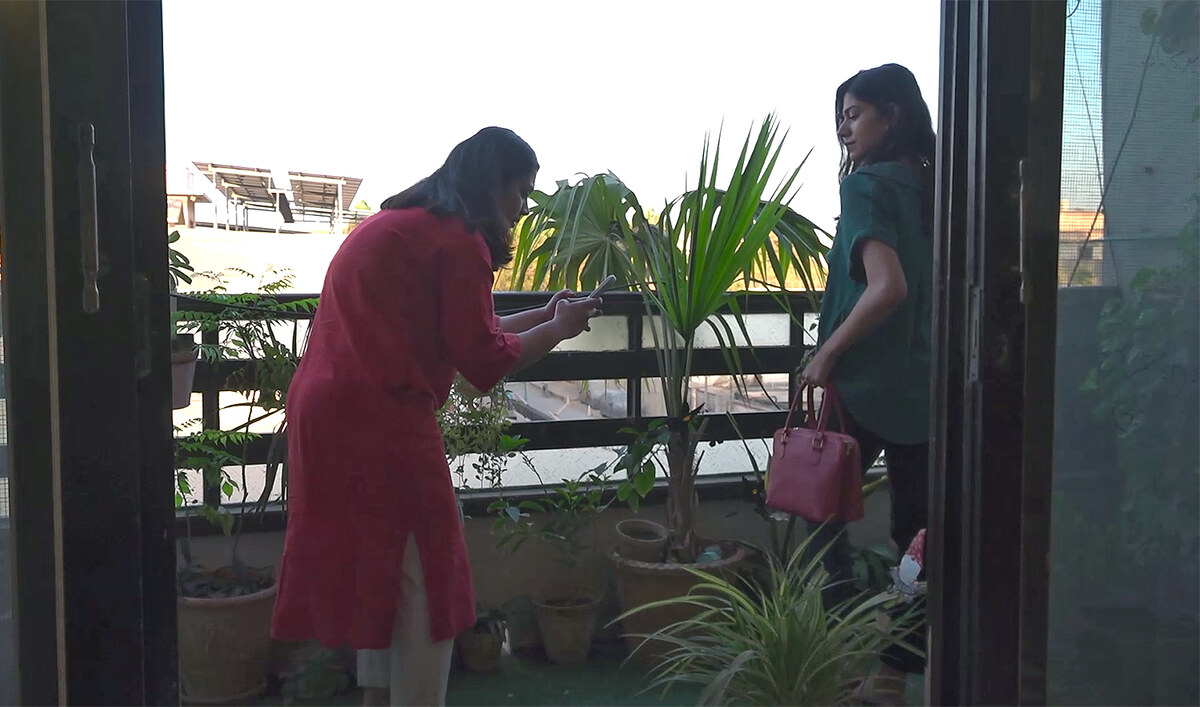
Born and raised in Karachi, the sisters belong to the Dawoodi Bohra community. The family’s shop in Saddar still exists, with their grandfather’s working table still intact. Two of the workers, who started out with their father years ago, still work at the shop and mainly look after the production side of affairs with Hussain.
“People nowadays kill to buy pure leather products, but we don’t have the kind of market for pure leather products here. The players that we have in the market are really expensive for the masses to buy,” Sakina told Arab News.
“And that’s kind of where the idea of Turab came into being. We wanted to create something that’s not only good quality leather but also really affordable.”
Both Marium and Sakina have since been pushing their family legacy forward with a fresh, modern touch.
“As far as the designing is concerned, that’s where we come in. We decided to make the most modern and minimal products that you don’t find in the market,” Marium told Arab News.
Turab offers a range of leather products including tote bags, cross body bags, duffel bags, wallets, travel organizers and laptop sleeves in shades of red, green, orange, yellow and blue.
“Being two women, who like to carry good bags [and] funky colors, the inspiration comes from within. All the players in the market that we have for pure leather, they typically go around the shades of browns [and] blacks,” Sakina said.
“And while that’s a big classic, the youth of today really resonates with vibrant and funky colors and that’s something that we’ve tried to incorporate in our brand.”
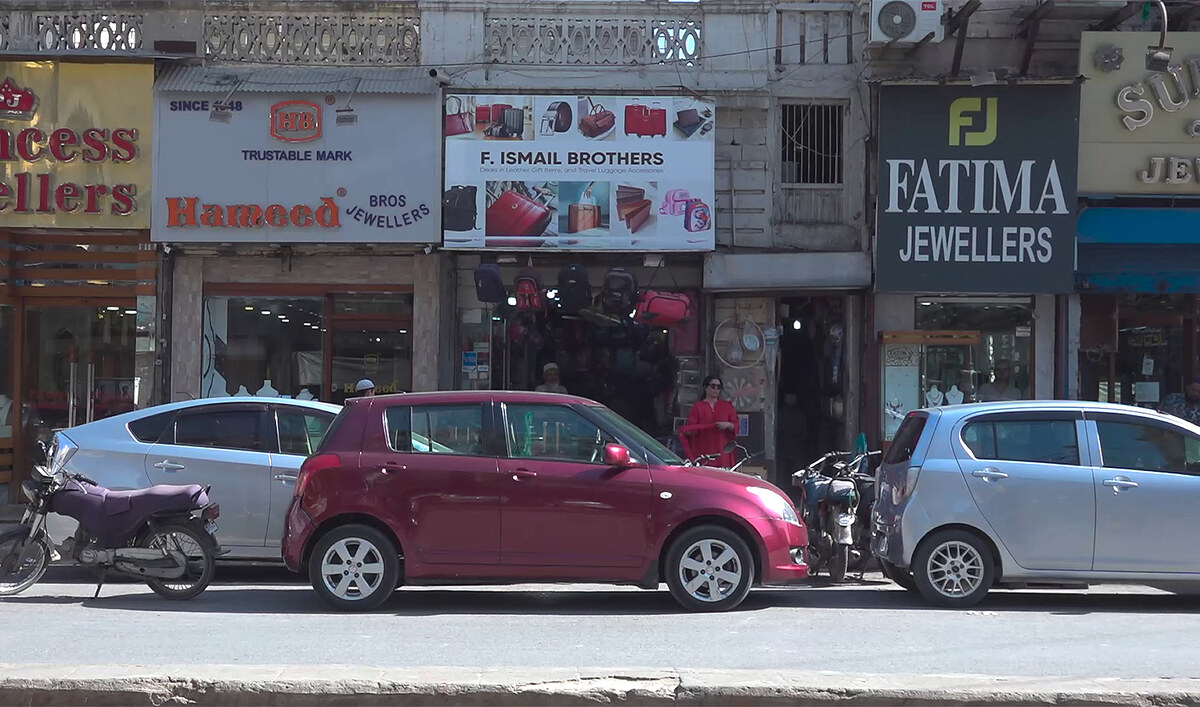
As co-founders, the two sisters manage most domains of the online business themselves. The branding is taken care of by Marium.
She also does product photography herself, with Sakina modelling for it.
“It’s a home-based setup [and] that’s how it started. We started making all of our products at the shop and then we brought it home. We converted our dada’s [grandfather’s] room basically into the Turab room and that’s where we store all of our products,” Marium said.
The sisters have been to pop-ups and exhibitions, which they say has really helped elevate their business.
But it has its challenges too.
“When people see two women behind the table, specifically men, they come and try to question the knowledge that we have about leather [and] about the product we are selling,” Sakina shared.
“They probably think that we don’t know enough or not more than them.”
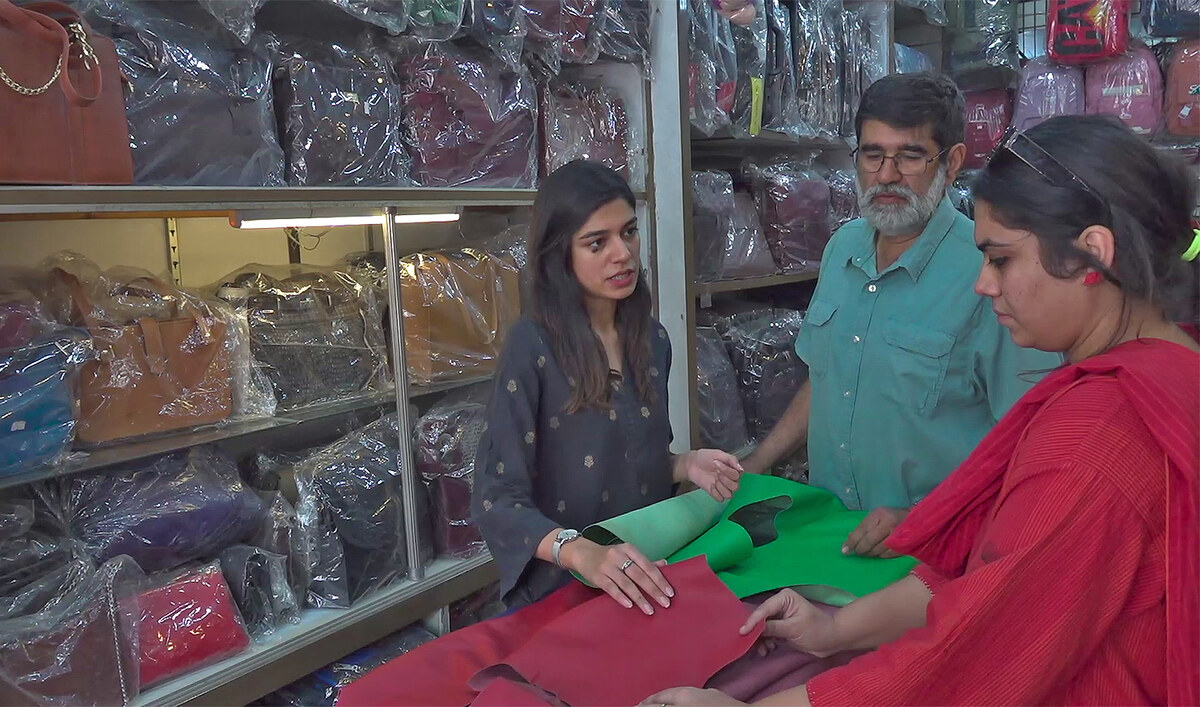
Marium, on the other hand, was initially not taken seriously by the artisans at her grandfather’s shop.
“I often go to [our shop in] Saddar to discuss the production side and the karigars [artisans] often don’t take me very seriously. They give me that look that, ‘we will talk to your dad. He knows, you don’t know’,” she said, adding that she hasn’t see any women anywhere near the leather goods production side at least.
However, her father vouched for the skill of both sisters to run the business.
“They catch everything very quickly,” he said. “The leather business is a bit technical. It took them about a year and a half [to learn], but now they can feel everything and tell you what is leather and what is not.”
The two sisters have carved a niche and the future looks promising as they plan to launch a physical outlet and make Turab a “household name” not just in Pakistan, but beyond.
“From packing orders every two days to one week, now packing every single day [and] multiple orders in a day, we have come a long way. And just going forward,” Marium said.
“We got a couple of orders from Dubai. Right now, I am talking to someone in Canada [and] the USA.”
Lebanese model Nour Arida reveals new looks at Paris Fashion Week

DUBAI: Lebanese model Nour Arida has been making waves at Paris Fashion Week, showcasing a fresh fair-haired bob while attending some of the season’s most anticipated shows.
The model has been spotted at various runway events, including Nina Ricci, Chloe, and Rabanne.
For the Chloe show, Arida embraced a luxurious, vintage-inspired aesthetic in a floor-length tiger-print fur coat layered over a black jumpsuit. She accessorized with bold gold jewelry, a structured red handbag and burgundy stiletto heels.
She turned heads in her Rabanne look, stepping out in a striking metallic mini dress made of reflective mirror-like panels connected by metal hardware. The futuristic geometric design featured bold cutouts on the back. She completed the look with a shimmering silver chain-link bag and matching platform heels.
Arida opted for a glamorous yet playful take on classic Parisian style for the Nina Ricci show. She wore a strapless black polka-dot mini dress with ruched detailing, paired with sheer black tights. A matching polka-dot scarf wrapped around her head, adding a vintage Hollywood touch, while black cat-eye sunglasses and red lipstick completed the ensemble.
Arida was not the only Arab fashion star making waves in Paris. Another standout moment came from Gigi Hadid, who commanded the runway at Schiaparelli.
The US Dutch Palestinian model opened the Schiaparelli show on Thursday wearing a black wool crepe jacket featuring an oversized tonal shearling collar. Cinched at the waist, the jacket was accentuated by belt straps adorned with Schiaparelli’s signature keyhole bijou in gold metal.
The supermodel paired the statement jacket with matching high-waisted cowboy pants and accessorized with the brand’s trompe l’oeil earrings in hammered golden brass, shaped like an alligator’s tail.
Iraqi artist Afifa Aleiby unveils new painting of historical women from Islamic civilization

SHARJAH: What do Wallada Al-Mustakfi, Rufaida Al-Aslamia, Dayfa Khatun, and Aminatu have in common? They are all distinguished women in Islamic history that you more than likely have never heard of before. That is about to change thanks to a new painting by the acclaimed Iraqi artist Afifa Aleiby, whose colorful “A Wonderful World,” pays tribute to 16 noteworthy Muslim women whose names have faded away over time.
Commissioned by the Barjeel Art Foundation in Sharjah, the painting will be on public display at the House of Wisdom in Sharjah until the end of Ramadan and will later be transferred to the Sharjah Museum of Islamic Civilization.
Aleiby’s work is a companion piece to a 1988 painting titled “Islamic Scientists,” by the late Syrian artist Mahmoud Hammad and currently in the collection of Barjeel Art Foundation.

In his composition, Hammad highlighted 16 influential male scholars and physicians, including Ibn Sina and Ibn Rushd. “Exhibited together for the first time, these artworks stand as a powerful reminder of the transformative impact of these intellectuals, both men and women, on the history of Islamic civilization," reads a wall text. The recent unveiling event opened with a panel talk, where Aleiby and Hammad’s daughter, Lubna Hammad, discussed the displayed artworks.
Aleiby noted some of the difficulties in taking on this open-call commission, including a lack of resources, literary and visual. “Some of these women have only two or three lines written about their history and role,” she said.
In her detailed piece, dotted with symbolic elements (such as the proud peacock and a library of books) and set against a serene landscape, Aleiby depicted notable women of medicine, astronomy, poetry, science, education and military leadership who lived between the 7th and 17th centuries in Africa, Andalusia, India, and the Arab world.
One of these figures is Razia Sultana, who was born in the 13th century and went on to become the first and only female ruler of the Delhi Sultanate in India. From the 11th century, there is also a depiction of Safiyya bint Abdullah Al-Riyy, who was a skilled calligrapher and poet in Andalusia. Another Andalusian woman of poetry is the rebellious and liberal Wallada Al-Mustakfi, who formed a literary salon that was a meeting point for male and female voices.
What to wear this Ramadan: A selection of seasonal collections from international brands

RIYADH: This Ramadan, top fashion brands from around the world are debuting limited-edition collections and campaigns that fuse traditional influences with contemporary style, capturing the essence of this season of reflection and celebration.
Missoni

Missoni’s SS25 Ramadan Capsule Collection blends elegance with modest designs, featuring flowing dresses, wide-leg pants, soft blouses, and layered cardigans. “Evoking themes of renewal,” according to the press release, the palette features rich greens and sandy hues, with the Italian label’s signature zigzag Raschel fabric and metallic embroidery.
Tory Burch

The US designer’s Ramadan collection features both clothing and accessories, including the Eleanor Metallic Mini Satchel in gold, lavender, and silver, paired with chic slingbacks and mules. Lightweight silk separates in the brand’s signature T Monogram could work for iftar and suhoor gatherings. The collection also features jewelry with pave crystals, pearls, and star charms, along with classic watches.
Loewe

The Spanish luxury house’s collection — the campaign for which is fronted by Saudi Arabian actress and filmmaker Sarah Taibah — “celebrates effortless sophistication with a curated selection of ready-to-wear, handbags, and accessories designed for the season.” It features kaftans, tunics, and wide-leg trousers in a muted palette of sand, ivory, and deep emerald, enhanced with delicate embroidery and metallic accents. The collection also sees the brand’s signature bags get a Ramadan makeover.
Farfetch

The luxury label platform is running a modestwear campaign for Ramadan, “featuring chic neutrals, bold prints, and exclusive designs.” With a focus on family, togetherness, and celebration, the collection features tailored suits, flowing kaftans, dreamy evening dresses and luxe loungewear. Featured labels include Brunello Cucinelli, Burberry, Oscar de la Renta, and Shatha Essa.
McQueen

The British luxury fashion house has launched a six-piece capsule collection, with flowy florals and dreamy drapes — from wide-leg trousers and oversized shirts to a midi dress with delicate bib detailing. For evening glamour, there’s a twisted-drape tunic and a chiffon cape dress with crystal embroidery. For accessories, pick from a fuchsia python, black suede T-Bar bags and clutches, and gold-crystal embellished sandals and ruched mules.
Coach

Palestinian-Chilean singer Elyanna is the face of the US label’s Ramadan campaign, “celebrating modern elegance with a touch of timeless charm.” The collection showcases signature pieces including leather handbags, tailored coats, and flowy dresses, all in soft neutrals and metallic accents with an emphasis on comfort, versatility, and sophistication.
Tom Ford

The US fashion label’s first ever Ramadan capsule collection includes four women’s and three men’s looks, and accessories ranging from bags to shoes. The collection draws inspiration from night and day, with tones ranging from beige to blue. For women, the items include a matching set of kaftan and shirt. For men, the items include a bomber jacket, trousers, shirt and shorts.
Dior

The French luxury label’s collection features a rich palette of gold, ivory, and deep jewel tones. You’ll find elegant kaftans, flowing dresses, and tailored separates, each crafted with luxurious fabrics and intricate detailing. Metallic accents, delicate embroidery, and shimmering embellishments elevate the designs, making them perfect for both daytime and evening celebrations.
Recipes for Success: Chef Dexter Gelizon offers advice, a recipe for avocado ceviche

DUBAI: Filipino chef Dexter Gelizon, is currently sous chef at Dubai’s sister restaurants Salvaje (which serves Japanese cuisine) and Arrogante (Italian).
“My journey as a chef began when I was 17 years old, helping my aunt run her food truck,” Gelizon tells Arab News. “It was there that I started honing my palate and developing my skills in creating innovative recipes. Over time, I fell in love with Japanese flavors and techniques, which completely transformed my path.”
But his love for cooking was sparked at a much earlier age.
“My earliest memory of cooking goes back to when I was five, making adobo — braised chicken in soy sauce — with my mom. That left a lasting impression on me,” he says.
Here he talks salt, simplicity, and sharpness.
What was the most common mistake you made when starting out?
Overcomplicating the plate. I’d focus too much on presentation and lose sight of the most important element — the flavor. Now, I prioritize flavor and quality above all else.
What’s your top tip for amateur chefs?
Invest in good-quality equipment and utensils. A sharp knife, a reliable stove or induction cooktop, and sturdy pans can make all the difference. Having the right tools makes the cooking process smoother, but it also sets the tone for a positive and enjoyable experience. When I see a well-equipped kitchen, it puts me in a good mood and inspires me to prepare food with care and enthusiasm.
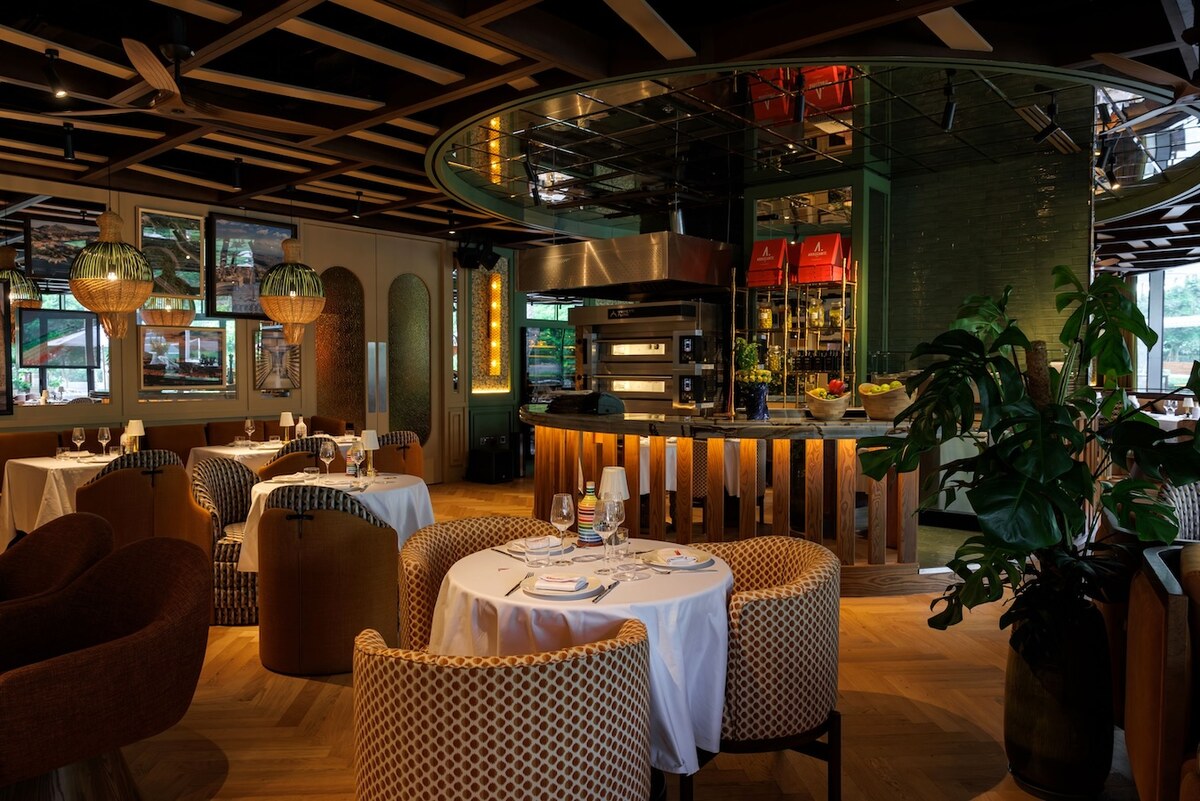
What one ingredient can instantly improve any dish?
Salt. It has the power to elevate and balance the flavors, bringing out the best in every ingredient. But achieving the right balance can be tricky — it requires precision and care. Too little, and the flavors might fall flat; too much, and the entire dish can be ruined.
What’s the most common issue that you find in other restaurants when you go out?
The experience for diners starts with the service — it sets the tone for the entire meal. When the staff explain the dishes on the menu with enthusiasm and precision, it excites me and heightens my anticipation. However, if the service fails to make a good first impression, it can shift my focus, and I might start noticing flaws or areas for improvement. Service and atmosphere are as important as the food itself in creating a memorable dining experience.
What’s your favorite dish?
I always look for ramen. It’s incredibly satisfying. I love exploring how different chefs are evolving and innovating with flavors and techniques. Ramen is fascinating to me because it’s so complex — every component, from the broth to the noodles and toppings, needs to be perfectly balanced. It’s tricky to get right, but when done well it’s absolutely delicious and a true testament to a chef’s skill.
What’s your go-to dish if you have to cook something quickly at home?
A combination of eggs, sausage, rice, and soup. It’s quick to prepare, satisfying, and gives me the energy I need — perfect for a busy day.
What customer behavior most frustrates you?
What annoys me most is when customers deconstruct a well-prepared dish that has a perfect balance of flavors. Each element is carefully crafted to complement the others, so altering it can disrupt the harmony and intention behind the dish.
What’s your favorite dish to cook?
Braised short ribs in peanut sauce, a dish my mom calls Kare Kare. Braising the short ribs is a complex and time-intensive process, but the result is incredibly rewarding. There’s a deep sense of pride and satisfaction when you achieve perfectly tender meat paired with a rich, creamy peanut sauce. It’s a dish that carries a lot of sentimental value for me.
What’s the most difficult dish for you to get right?
From the Salvaje menu, the most challenging dish is the Salvaje steak. There are two crucial components to manage — the steak and the sauce. Timing is everything. If the timing is off, the steak can easily become overcooked, and the sauce can split and turn oily. Once that happens, there’s no way to fix it — you have to start over from scratch. It requires precision and focus to ensure it’s served perfectly every time.
What are you like in the kitchen? Are you a disciplinarian? Or are you more laid back?
I’m a disciplinarian, but in a calm and constructive way. I see myself as a teacher, focusing on guiding and correcting where needed. If I ever raise my voice, it’s only because something has gone seriously wrong — but I work hard to ensure it doesn’t come to that.
Chef Dexter’s avocado ceviche recipe
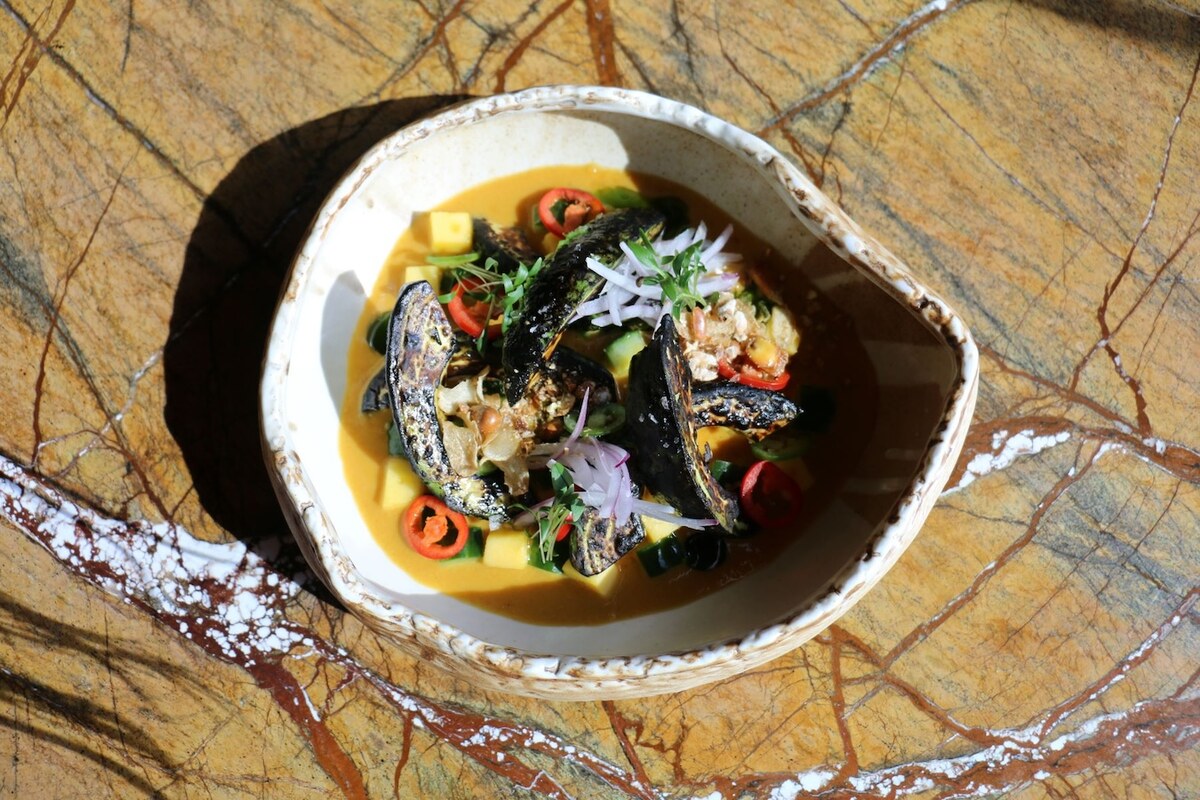
Char-grilled avocado with amarillo ponzu, fried corn, chili, mango, cucumber and onion
Procedure:
Cut the avocado into quarters, grill it to get smoky flavor, put on a plate and drizzle with amarillo ponzu, add the rest of the vegetables randomly, finish with salt and olive oil.
INGREDIENTS:
Amarillo ponzu
8g yellow hot pepper paste; 10g ponzu; 5g yellow capsicum; 6ml olive oil; salt to taste; lemon juice to taste
Procedure:
Roast the yellow capsicum, allow to cool then remove the seeds. In a food processor, mix all the ingredients apart from the olive oil until you get a paste. Slowly add the olive oil until emulsified. Season with salt and lemon.










